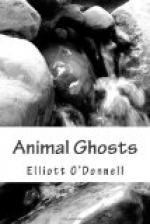“The moments passed in a breathless state of tension. He stared at the eyes, and the eyes stared back at him. Once he endeavoured to rise, but a dead weight seemed to fall on his shoulders and hold him back; and twice, when he tried to speak—to make some sound, no matter what, to break the appalling silence—his throat closed as if under the pressure of cruel, relentless fingers.
“But the Ultima Thule of his emotions had yet to come. There was a slight stir behind the canvas, a thud, a hollow groan that echoed and re-echoed throughout the room like the muffled clap of distant thunder, and the eyes suddenly underwent a metamorphosis—they grew glazed and glassy like the eyes of a dead person. A cold shudder ran through the Dean, his hair stood on end, his blood turned to ice. Again he essayed to move, to summon help; again he failed. The strain on his nerves proved more than he could bear. A sudden sensation of nausea surged through him; his eyes swam; his brain reeled; there was a loud buzzing in his ears; he knew no more. Some moments later one of the College servants arrived at the door with a bundle of letters, and on receiving no reply to his raps, entered.
“‘Good heavens! What’s the matter?’ he cried, gazing at the figure of the Dean, lolling head downward on the table. ’Merciful Prudence, the gentleman is dead! No, he ain’t—some of the young gents will be sorry enough for that—he’s fainted.’
“The good fellow poured out some water in a tumbler, and was proceeding to sprinkle the Dean’s face with it, when, a noise attracting his attention, he peered round at the picture. It was bulging from the wall; it was falling! And, Good God, what was that that was falling with it—that huge black object? A coffin? No, not a coffin, but a corpse! The servant ran to the door shrieking, and, in less than a minute, passage and room were filled to overflowing with a scared crowd of enquiring officials and undergraduates.




